A full house of newcomers and old hats alike greeted the speakers at the most recent instalment of our Future of Work event series. These gatherings examine how businesses can adapt their approach towards developing people in a world of rapid and myriad change.
All too often we fixate on the next big technological development at the expense of considering the human element to change. After all, it is the people within a business that make change happen. As a result, we need to ensure that employees are well supported and developing so that they can perform and feel confident in our rapidly changing workplaces.
This requires clear, long-term thinking on the part of businesses, big and small, as well as individuals taking the lead in determining their own futures. As individuals, we’re increasingly conditioned to look short-term and to seek immediate rewards. And it’s no surprise when senior leaders tend to be trapped in a double-bind of short-term thinking and reactionary decision making in a desperate attempt to meet quarterly results, rather than planning sustainably for the future.
In such a dynamic, fluid jobs market, it is a challenge for individuals and businesses alike to take a longer-term approach to career planning. As each of the evening’s speakers was quick to point out, working out how to effectively upskill employees within your business so that they can progress towards their own career end goals can provide significant and lasting benefits across all levels of an organisation.
“The more of these conversations you’re having, the more below-the-line issues come up and the more you can be aware of how you’re stacking up against the competition in the market”
— Lucy Mack, Head of People at MarTech business at Yieldify
The first speaker of the evening, Lucy Mack, Head of People at fast-growing MarTech business Yieldify, highlighted that, with more competition in the external market for talent and with job roles evolving significantly faster than they ever have before, creating an environment where honest two-way conversations can take place is a fundamental part of creating successful and healthy employee-employer relationships:
“The more of these conversations you’re having, the more below-the-line issues come up and the more you can be aware of how you’re stacking up against the competition in the market,” she submits. “It also makes it easier to have conversations with employees as their job roles evolve.”
In 2017, more than 60% of those leaving Yieldify were unexpected, meaning job roles were left open for longer than was healthy for the business. In looking to improve its intra-company communication, Lucy and the Yieldify team started asking employees to find examples of job descriptions from other companies for roles they would want to be doing in a few years’ time – which was used as a basis for creating an individual development plan.
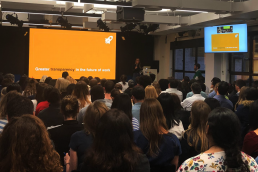
“In order to prepare for the fluidity of the future of work, you need to arm yourself with different skills to help you weather against whatever will happen in the future,” Lucy explains. “It’s about looking long-term and developing outwards rather than looking to the short-term next step.”
Realising that people now typically stay at a business for around two years, Yieldify knew that they needed to create an environment that would enable employees to openly discuss their career paths and aspirations without fear of negative consequences. Following the implementation of this programme, the percentage of unexpected voluntary leavers has fallen to 5%, giving the Yieldify team much more time to find the right replacement when someone moves on and ensuring greater continuity within the business.
“By creating tangible processes around transparency, we can turn it into something that both the employee and employer can put into action, which can result in positive commercial outcomes.”
The challenge facing Fiona Williams, Head of HR at renowned engineering consultant BuroHappold, was the need to restructure the learning and career development provision for a global 1,800-strong workforce of engineers to make it fit for purpose in a rapidly transforming technological landscape.
BuroHappold’s previous approach had a heavy emphasis on classroom-based training and score-based employee assessment that was preventing meaningful career conversations from taking place. With development opportunities one of the main reasons people were moving on, a radical overhaul of how the business handled its employee development was needed.
“We know we have multiple generations in the workforce and technology itself is widening the skills gap between the older and newer generations,” Fiona notes. “We have to think about learning that appeals to everyone, not just the generation that is coming into the business.”
By introducing instructor-led virtual workshops that employees could self-nominate for, BuroHappold provided a flexible learning framework where people can learn whenever and wherever is best for them. The virtual nature of this platform – along with adopting the social learning platform Yammer and a peer-to-peer mentoring app called Runway – has allowed employees from across the world to share ideas and knowledge.
“We’re using technology to break down silos and bring our colleagues closer together,” Fiona points out. “Our staff work on projects globally, so why shouldn’t they also learn in this way?”
— Fiona Williams, Head of HR at BuroHappold
With BuroHappold looking to upskill its workforce to apply automation and digitalisation to all of its projects, many current employees are moving into non-traditional job roles in areas such as machine learning and coding. The new learning and development framework is designed not only to develop the hard skills needed for these roles but also build the competencies that a digitally proficient workforce needs, such as adaptability, strategic thinking, innovation and creativity.
“We’re constantly learning and adapting but that’s what excites me about the digital era; it doesn’t allow you to sit still as you constantly have to reassess how you develop your colleagues,” Fiona admits. “What we’ve seen is an increase in discussions mapping out career plans and objectives, which is fantastic as it tells us we’re on the right track and that what we’re doing is really working. We’ve also received really good feedback from our digital workshops and attendance has improved – so people are really taking control of their own learning.”
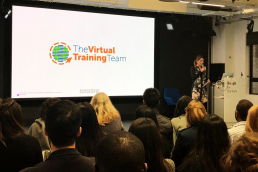
“It’s an increasingly fluid world and change will never be this slow again,” believes Nick Wright, UK Managing Director at Hyper Island, which operates as a learning specialist for the digital world. Working with individuals and clients, Hyper Island provides assistance for businesses looking to stay on top of technology by creating road maps for change and helping to make them stick once they are in place.
For Nick, the strategy for dealing with the workplace fluidity that we collectively face can be boiled down to a single focal point: people.
“Of course it’s about people – that’s what makes the difference,” he suggests. “Our belief is that through self-leadership, you can start to impact the work within your organisation. If you can do that, then you can create sustainable change because the organisation is changing fluidly with the disruption that it’s facing from the technology at the top.”
“When we talk to organisations it’s about building better leaders throughout the whole of the organisation, from those who’ve just joined through to the most senior.”
— Nick Wright, UK Managing Director at Hyper Island
Nick suggests that the reductionist, command-and-control approach to management that focuses on creating efficiencies to drive profit is no longer applicable in today’s more networked society. Instead, he suggests that businesses are moving from being product-centric to customer-centric, with decisions being made then enacted through distributed mandate – hence the requirement for self-leadership across all levels of the business.
“When we talk to organisations it’s about building better leaders throughout the whole of the organisation, from those who’ve just joined through to the most senior.”
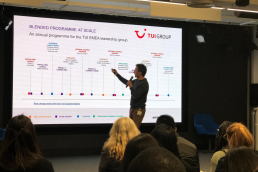
While Hyper Island creates a learning journey for each organisation it works with, centred around workshops, coaching and peer-to-peer mentoring, the most important element it introduces is to create a learning community with the business, which helps to nudge and reinforce the skills that employees have picked up through the educational journey to ensure they are applied to the business going forward.
“The learning community is the bit that holds the whole journey together,” Nick explains. “We’ve realised in the work that we do that this learning session is just one aspect of this, peer coaching is another aspect, and the webinar is another piece yet again. But the community is what really creates change within an organisation.”
If you’d like to come along to one of our upcoming Future of Work events, then follow us @WiseAmigo our social channels below or sign up to our mailing list to be the first to know when tickets are available. We look forward to seeing you there!
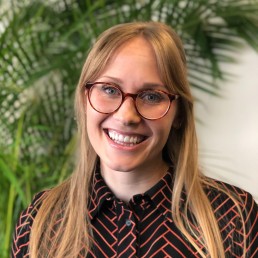
Lucy Mack
Head of People at Yieldify, a high-growth MarTech company, listed in the Sunday Times Tech Track 100 and the Deloitte UK Technology Fast 50. Lucy manages Global People Operations across London, New York, Sydney and Singapore.
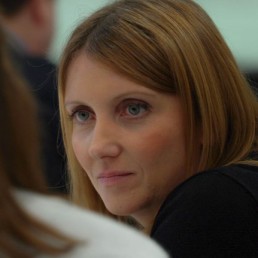
Fiona Williams
Head of Human Resources at engineering consultant BuroHappold, a global engineering consultancy firm for the built environment, employing engineers and consultants from around the world to lead iconic projects for 44 years.
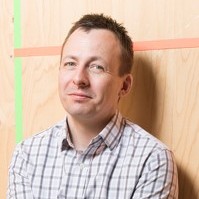
Nick Wright
UK Managing Director at Hyper Island, a learning specialist for the digital world. Nick covers Hyper Island’s perspective on learning and development relating to organisational change, plus how to create and sustain learning communities.
Development is a journey. The WiseAmigo app and community are here to help you along the way. Join the WiseAmigo community, create a Spotlight, discover more insightful content and reflect on your development journey today!
SaveSave
SaveSave
